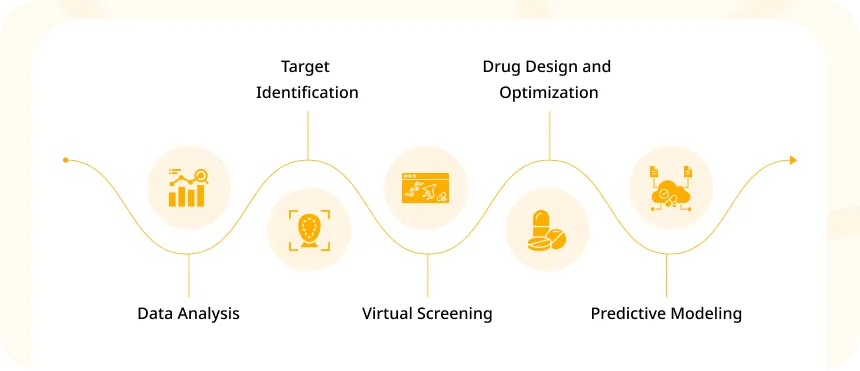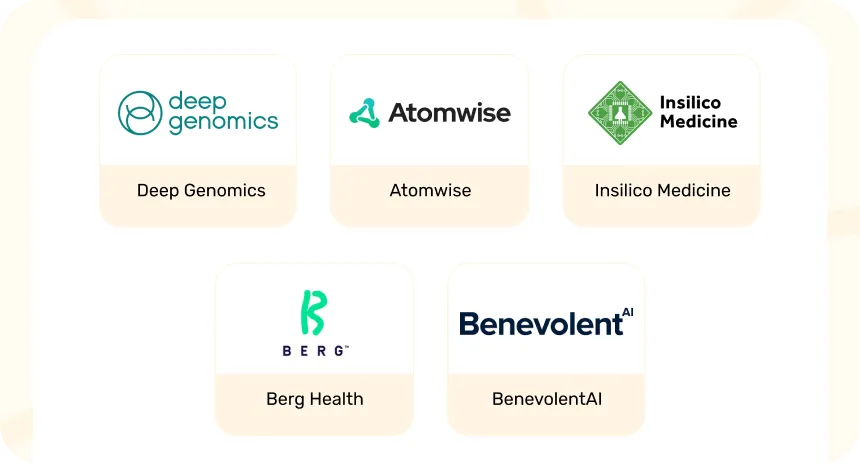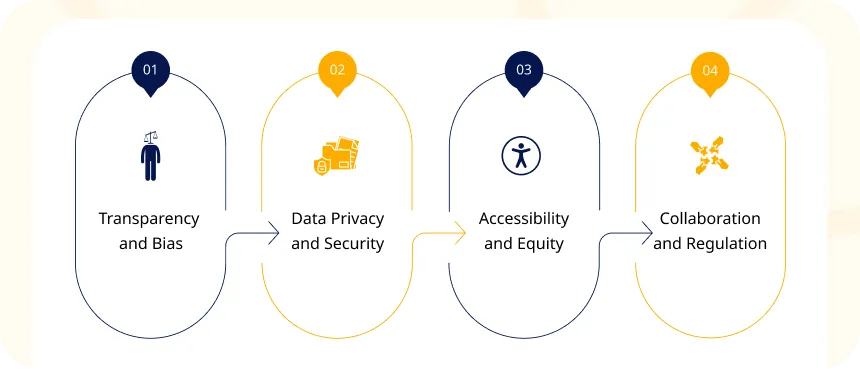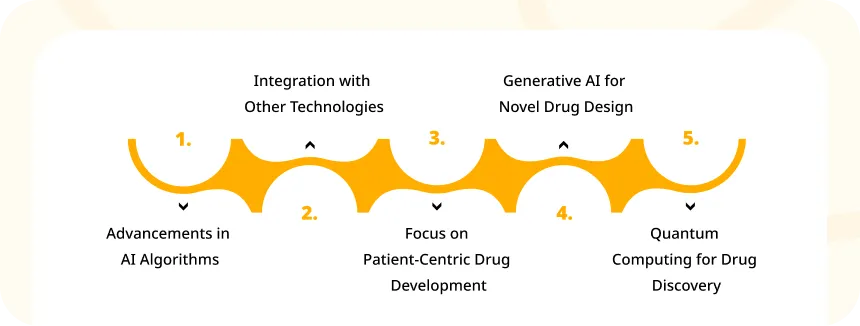Do you know that developing a new drug can take more than a decade and may cost billions of dollars?
Well, that’s how slow the traditional drug discovery process is, which is not only expensive but often fails to deliver desired results.
But what if there was a way to accelerate this process, increase success rates, and significantly reduce costs?
That’s where AI and ML come in. These powerful technologies are changing the drug discovery process, offering a new wave of innovation and efficiency. Through this post, we’ll address two key questions:
- How can AI help us find new cures faster?
- What are the ethical considerations surrounding AI-driven drug development?
Let’s explore how AI and ML are being used to find new medicines and change the future of healthcare.
How AI & ML Are Reshaping Drug Discovery?
The introduction of AI and ML is the new powerhouse in drug discovery.
The pharmaceutical industry is currently facing major challenges: the conventional drug discovery process is expensive, time-consuming, and often unsuccessful.
As mentioned earlier, it can take over a decade and may cost billions of dollars to bring a new drug to market, and even then, many promising contenders may fail in clinical trials.
AI and ML technologies with custom healthcare software development are changing the way we find and develop new medicines, offering a faster, more efficient, and cost-effective approach.
ValueCoders provides the latest AI & ML solutions to accelerate your drug discovery pipeline.
Here’s how AI and ML in drug discovery are making a difference:
Data Analysis
The pharmaceutical industry generates huge amounts of data, from genetic sequences to patient records. AI is transforming drug discovery by evaluating this data and identifying patterns and insights that humans might miss out on. This supports researchers in finding potential drug targets, predicting drug effectiveness, and understanding how drugs interact with the body.
Target Identification
AI can collect vast databases to find new drug targets – specific molecules or linkages in the body that can be targeted to treat diseases. This can open up new possibilities for drug development, leading to innovative treatments for diseases that are currently difficult to treat.
Virtual Screening
Traditionally, drug screening meant testing thousands of molecules in the lab, a lengthy and expensive process. AI can improve this process with virtual screening. Using advanced algorithms, AI can analyze vast libraries of molecules and predict their potential efficacy and safety, allowing researchers to focus on the most promising candidates for further testing.
Drug Design and Optimization
AI can even help design and optimize new drugs. It can generate new molecules with improved efficacy, safety, and target specificity by analyzing existing drugs and understanding their molecular interactions. This allows researchers to develop better drugs with fewer side effects.
Predictive Modeling
AI can develop predictive models to assess drugs’ efficacy and toxicity before they are tested in humans. This can guide researchers to make informed decisions about which drugs to develop and which clinical trials to run, leading to faster and more successful outcomes.
AI and ML in drug discovery are changing the game. By utilizing their power, we can develop new treatments faster, more effectively, and at a lower cost, bringing hope to patients around the world.
Also Read: IoT in Healthcare: Benefits, Challenges and Applications
Real-World Examples
The power of AI and ML in drug discovery isn’t just a theoretical concept; it’s being implemented and yielding results in the real world. Here are a few examples of the tangible impact of AI on drug discovery:
1. Deep Genomics
This company uses AI to analyze genetic data and predict disease outcomes. They’ve developed a platform that can identify genetic mutations associated with specific diseases and predict how these mutations will affect a patient’s response to treatment. This helps researchers develop personalized therapies that are more effective and tailored to individual needs.
Streamline your drug development process with our AI & ML solutions and make it cost-effective.
2. Atomwise
Atomwise has developed an AI-powered platform for target identification and virtual screening. Their technology can analyze the structure of proteins and identify potential drug candidates that could bind to these proteins and block their activity. They’ve successfully identified new drug candidates for treating diseases like Alzheimer’s and cancer.
3. Insilico Medicine
This company uses AI to design and develop new drugs from scratch. Their platform can generate novel drug candidates based on specific target profiles and predict their efficacy and safety. Insilico Medicine has successfully designed and developed new drugs for treating cancer and other diseases, showcasing the potential of AI to strengthen the entire drug discovery process.
4. Berg Health
This company uses AI to analyze patient data and identify potential drug targets. Their platform can analyze massive datasets from electronic health records, medical imaging, and other sources to identify patterns and biomarkers that could be used to determine disease progression and identify potential drug targets. Berg Health is working on developing new therapies for diseases like Alzheimer’s, cancer, and diabetes.
5. BenevolentAI
This company partnered with AI development company to analyze vast amounts of scientific data, identifying potential drug targets and developing new drugs. BenevolentAI has made significant progress in developing treatments for diseases like Parkinson’s, Alzheimer’s, and rare diseases.
These are just a few examples of how AI and ML in drug discovery are changing. As these technologies are continuously growing, we can expect even more innovative applications and breakthroughs in AI in healthcare, particularly in AI/ML for drug discovery, in the years to come.
The Benefits of AI & ML in Drug Discovery
The application of AI and ML in drug discovery offers a wide range of benefits, promising a future where new treatments are developed faster, more effectively, and at a lower cost. Here’s a closer look at how these technologies are transforming the pharmaceutical industry:
Reduced Costs
Traditional drug discovery is incredibly expensive, with billions of dollars spent on research, development, and clinical trials.
The role of AI in drug discovery is significantly reducing costs by streamlining and optimizing processes.
Virtual screening and predictive modeling allow researchers to focus on the most promising drug candidates, minimizing wasted time and resources.
Faster Timelines
The conventional drug discovery process can take years, even decades, to introduce a new drug to the market.
AI speeds up this process by automating various manual tasks and providing quicker insights from data analysis.
This allows for faster identification of potential drug targets, more efficient screening of drug candidates, and improved clinical trial design.
Increased Success Rates
The success rate of traditional drug development is comparatively low. Many promising candidates fail in clinical trials because of unforeseen side effects or lack of efficacy.
Hire machine learning engineers to improve success rates by providing more accurate predictions about a drug’s potential efficacy and safety, helping researchers select the most promising candidates and reducing the risk of failure.
Personalized Medicine
When you hire AI engineers, they can help develop personalized medicine, tailoring treatments to individual patients as per their genetic makeup and other factors.
This approach offers more effective treatments with fewer side effects and may even prevent diseases before they develop.
New Drug Targets and Therapies
By extracting insights from massive datasets, AI can identify new drug targets that might have been missed by traditional methods.
This can open up new avenues for drug development, leading to innovative treatments for diseases that are currently difficult to treat.
ValueCoders can help you navigate the complexities of drug development with advanced AI & ML tools.
AI and ML in drug discovery are not just changing the speed but fundamentally changing how pharmaceutical companies approach healthcare.
By using these AI and machine learning solutions, they can develop new treatments faster, more effectively, and at a lower cost, bringing hope and healing to patients worldwide.
Addressing the Ethical Concerns
While AI and ML in drug discovery hold huge potential, it’s crucial to recognize and address the ethical challenges and limitations of AI in drug discovery surrounding their use.
As with any powerful technology, we must ensure responsible and ethical implementation to maximize benefits while minimizing potential risks.
Here are some key areas of concern and how we can navigate them responsibly:
Transparency and Bias
- Transparent AI Models: The algorithms used in AI models should be transparent and understandable, allowing researchers and regulators to assess their validity and identify any biases.
- Addressing Bias: AI models can inherit biases from the data they are trained on. It’s critical to find and address these biases, ensuring that AI-driven drug discovery is fair, equitable, and accessible to all patients.
Data Privacy and Security
- Protecting Patient Data: Drug discovery often includes handling vast amounts of sensitive patient data. Robust data privacy and security measures are important to protect this information and ensure its responsible use.
- Informed Consent: Patients should be aware about their data usage for drug discovery and given the opportunity to provide informed consent.
Accessibility and Equity
- Equitable Access to Treatments: AI-powered drug discovery should not worsen existing health issues. Efforts should be made to ensure that new treatments developed by an AI consulting company are accessible and cost-effective to all patients, regardless of their socioeconomic background.
Collaboration and Regulation
- Open Dialogue: Open dialogue and collaboration between researchers, ethicists, regulators, and policymakers are crucial for developing ethical guidelines and frameworks for AI-powered drug discovery.
- Responsible Regulation: Regulatory frameworks should be developed to make sure the safe and ethical use of AI in drug discovery, balancing innovation with patient safety and ethical considerations.
By addressing these ethical concerns, we can ensure that AI-powered drug discovery is used to improve the lives of all patients, not just few selected ones. A collaborative and responsible approach will be key to utilizing the power of AI for a healthier and more equitable future.
Also Read: Smart Finance’s Horizon: Navigating AI And ML In Banking & Insurance
The Future of AI & ML in Drug Discovery
AI and ML in drug discovery future is full of potential. As these technologies continuously grow, we can expect even more innovative advancements in the way we find and develop new treatments. Here’s a glimpse into what the future might hold:
Advancements in AI Algorithms
AI algorithms are constantly being refined and improved, becoming more advanced and powerful. This means we can expect even more accurate predictions, faster analysis, and more efficient drug discovery processes.
Integration with Other Technologies
The future of AI in drug discovery is not a standalone technology; it’s already being integrated with other technologies, like robotics, lab automation, and 3D printing, creating a more integrated and efficient drug discovery process.
In the future, you might find AI-powered robots performing complex experiments in labs or 3D printing custom-designed drugs based on individual patient needs.
Focus on Patient-Centric Drug Development
AI can personalize drug development, tailoring treatments to individual patients as per their genetic makeup and other factors. In the future, AI could help predict a patient’s response to a drug before they even start treatment, leading to more effective and personalized therapies.
Generative AI for Novel Drug Design
Generative AI models are being developed to design new drugs from scratch by learning from vast datasets of existing drugs and their properties. This could lead to the development of entirely new classes of drugs with unique properties and mechanisms of action.
Work with ValueCoders to integrate AI & ML, ensuring a more efficient and effective path to market.
Quantum Computing for Drug Discovery
Quantum computing can change drug discovery by solving complex problems that are currently unmanageable for classical computers. Picture AI algorithms running on quantum computers, accelerating drug discovery and discovering new insights.
The AI and ML in drug discovery is full of possibilities. It promises a future where new treatments are developed faster, more effectively, and personalized to each patient’s individual needs.
The future ahead is exciting and filled with challenges and opportunities, but it holds immense potential for changing the future of healthcare.
Concluding Thoughts!
AI and ML in drug discovery are not only changing the pace; they’re fundamentally transforming how we approach healthcare.
By using these powerful technologies, the pharmaceutical industry can develop new treatments faster, more effectively, and at a lower cost. This means new hope for patients, innovative therapies, and a healthier future for all.
At ValueCoders, we’re committed to helping pharmaceutical companies harness the power of an AI and machine learning development company to accelerate drug discovery and bring life-changing treatments to market faster.
Ready to discover AI’s potential for your drug discovery efforts? Contact ValueCoders and let’s work together to revolutionize healthcare.











